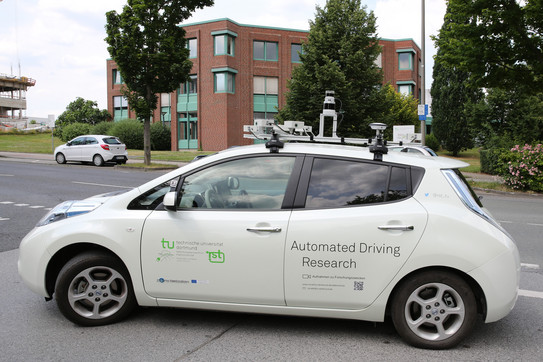DEmandäR - Data-based recommendations for automated driving in the rural region.
In the future, public transportation with automated vehicles can make a positive contribution to improving the quality of life in rural areas. Today, however, there is still a lack of knowledge and experience about the conditions under which operation with automated vehicles will be possible in public rural areas.
Infrastructure operators and road authorities need assistance in the form of guidelines/recommendations to enable regular operation with automated vehicles in rural areas in the medium term through targeted investments in infrastructure. The project starts at this point and aims to publish recommendations and proposals for action for infrastructure operators in order to create the substantive and structural conditions for (highly, fully) automated and autonomous driving.
In the context of this study, a representatively selected route will be driven regularly over a period of more than one year with a measurement vehicle under changing conditions (such as during rain, at night, at different times of the year, etc.) in order to record measurement data with various sensors covering the surrounding area (e.g., LIDAR, RADAR, cameras, high-precision DGPS, etc.). It is expected that the recorded data will provide different results for environment perception or environment modeling for automated driving, depending on the disturbing environmental influences. Processing the recorded measurement data with state-of-the-art algorithms allows conclusions to be drawn about the usability of automated vehicles on these routes. By identifying problems and their causes, the potential utilization level for automated driving on the selected routes can be determined and increased through possible infrastructural investments.
The information generated in this study has multiple uses: To adapt current mobility concepts and to derive knowledge on new mobility in the rural region. The recommendations and suggestions for forward-looking investments resulting from the study will ensure a smooth introduction of automated mobility. Furthermore, the measurement data as well as their evaluation will be published, so that they can serve infrastructure operators and road authorities, industry and science for the further development of current methods for environment assessment, especially from the point of view of the rural region, and also be available for the development/evaluation of alternative concepts. Compared to existing data sets, the data set to be created has the unique selling point that the data is recorded on a representative route for the rural region under different weather conditions, times of year and times of day.

![[Translate to English:] [Translate to English:]](/storages/rst-etit/_processed_/e/8/csm_Technologie_RST_2018_339_a0a62aaa2f.jpg)
